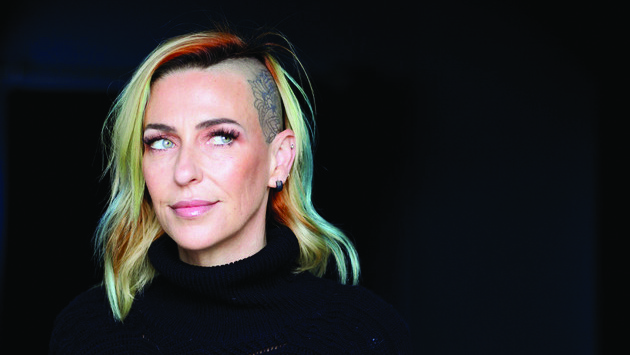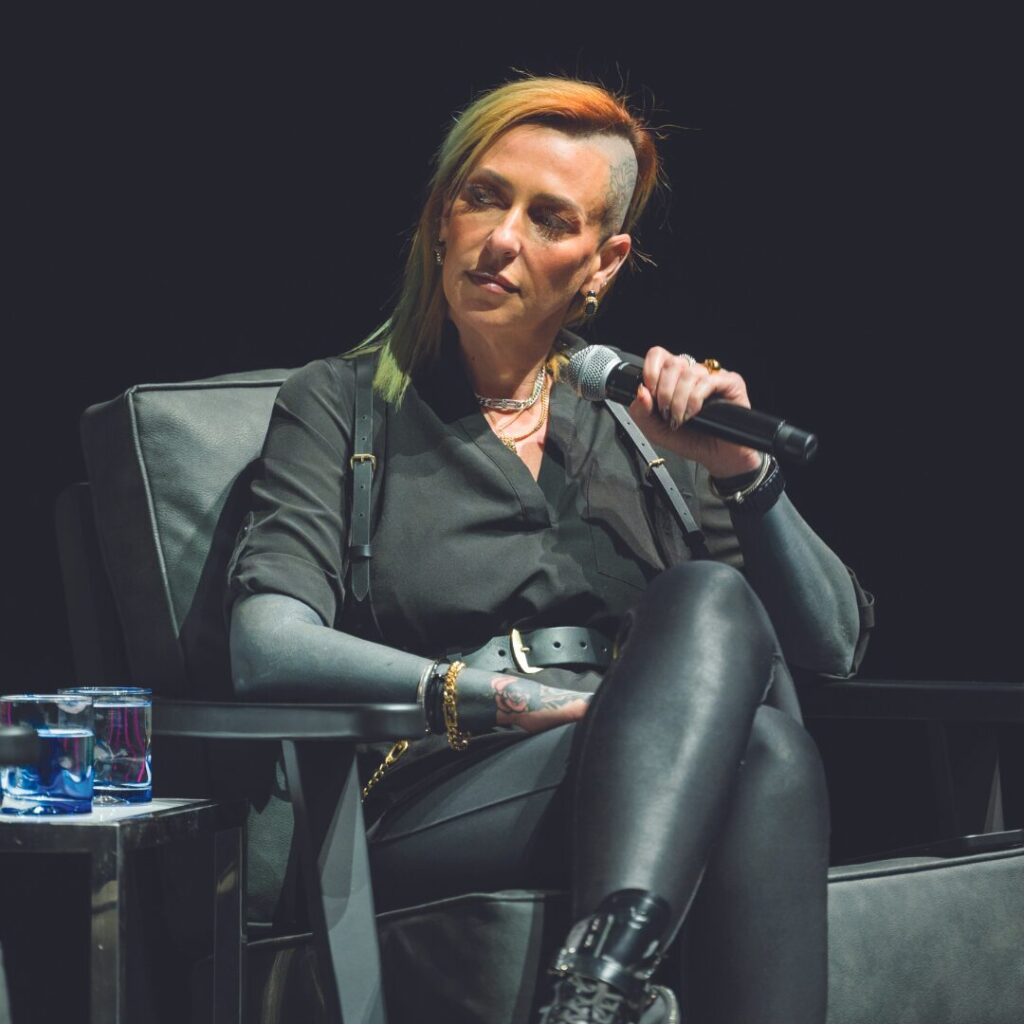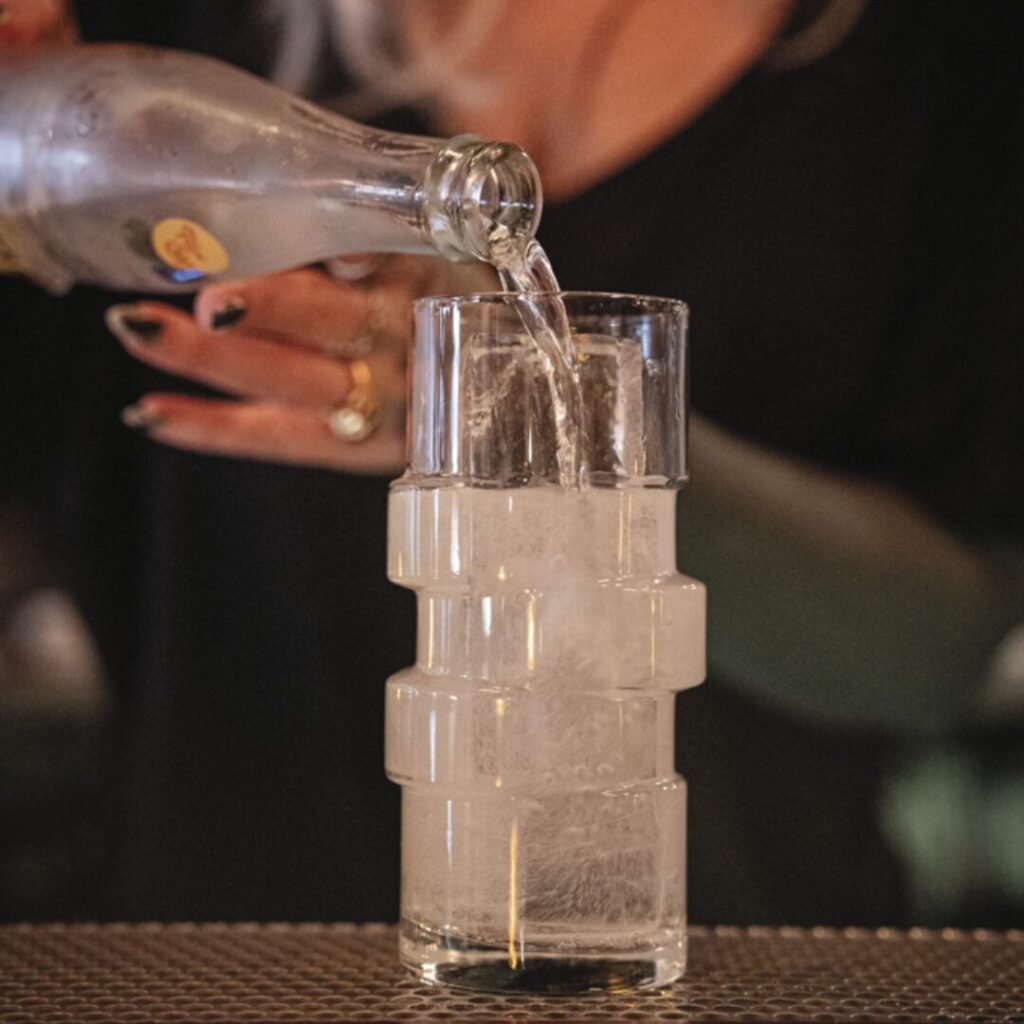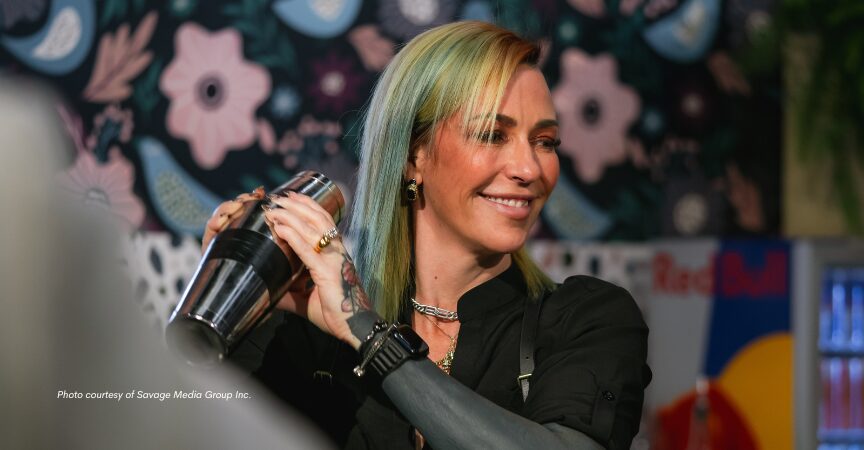You Don’t Know What You Don’t Know
MENU in Conversation with Bar Icon Kate Gerwin.

A force of nature behind the bar (and in general), Gerwin shattered glass ceilings as the first woman to claim the title of World Bartending Champion, and her journey since has been nothing short of astonishing. Kate’s story is a bittersweet cocktail of grit, passion, and the relentless pursuit of perfection, for both her craft and herself.
We connected with the mastermind behind Happy Accidents to uncover the secrets of her somewhat reluctant success and learn more about what drives one of the industry’s most influential figures to make time to mentor the next generation of bar talent.
MM: Can you describe the role mentorship has played in your career?
Kate Gerwin: For me, the role of mentorship in my career is a little tricky. I’m older—I’m 45—and there wasn’t a lot of mentorship around when I was coming up. Did I have great people who taught me? Yes. I had good bosses and bad bosses, but I learned a lot more about what I didn’t want to do and who I didn’t want to be than I ever did from people I respected and emulated. I really didn’t have a lot of super-strong people who wanted to take me under their wing—I learned more from the negatives—observing the acts of others and questioning why we don’t treat people better, or create safer environments, or do more education? The answer was always, “Well, that doesn’t make money,” or “You’ve got to have thick skin to succeed in this industry; you’ve got to be tough to be here.”
I thought, “What if hospitality is the problem, and not the people?” So, my role or approach to mentorship has been about trying to create an environment for people I don’t feel was there for me.
MM: So, your initial interest in bar mentorships was a reaction to supports you felt were lacking for you?
KG: I think so, but don’t get me wrong—I worked for people who taught me a lot, like the foundations of bartending, techniques, cocktail making and how to read a room, but there was a lack of a certain humanity and compassion and this idea that, especially for women, you had to be tough and you had to have thick skin and you had to be able to put up with things. I don’t know that that’s the healthiest way to get people to love an
industry, you know?
It’s really not that you have to be thick-skinned or tough to be able to handle things. It’s more that you need to know how to navigate those things with grace and compassion. I also think the customer isn’t always right. Putting up with bad behaviour just because someone is a customer wasn’t my idea of what hospitality is all about. It’s not healthy.
MM: Your point gets at one of the sleeping challenges in the hospitality industry—building the reputation of industry roles as careers, and people working in it as true professionals. Having to tolerate the extremes of poor behaviour is not only unfair and unsafe, but also a kind of gaslighting—like no matter what, the employee’s needs are secondary to the customer’s.
KG: You know, back when I started out, before the era of the ‘mixologist’, and even sometimes now, you were treated like an unskilled, uneducated worker certain customers felt they could boss around. When you’ve really invested time, energy and effort into studying and to learning technique and you’re trying to give people this incredible experience, it can be a lot to have person say, “Look, I know I’m in a Michelin-starred restaurant, and I’m sure you’re a great chef, but I really want some singles on Ritz crackers and you have to give it to me exactly how I want it because that’s what you’re here for.”
Hopefully these expectations are changing, but personally, no one ever allowed me the space to feel uncomfortable about it. It was more like, “This is who we are, and this is what we do. Just smile and tell the customer they’re right.”
MM: As you grew in your role and earned a certain amount of influence and clout, how did you feel was the right approach to hospitality industry mentorships?
KG: There are lots of different types of mentorship, and there are lots of different mentee-mentor relationships. I think a lot of times people just like look at their bar manager or their boss as a mentor, but sometimes it’s harder for your boss to be your mentor because your mentor should really get to know you on a different level and understand your goals. Their boss is also likely to coach them based on what works within the confines of the company, which may not be the best thing for the advancement of their career.
You can have mentors you work with from a distance, even if that’s Zoom calls. I think the first thing for me is a clear and open conversation about concise goals. As a mentor, I want to know what a mentee wants from me and my time. Do they just want to learn about cocktails or are they also wanting to learn about business or how to react to and manage social situations? Open communication about goals and expectations can really help establish the mentor-mentee relationship and make sure it works for both individuals.
MM: What are some of the most common challenges in the bar space, and how can mentors help mentees address them?
KG: A lot of people end up behind the bar because they were a server or something and they get promoted or thrown in. They’re given a recipe and told to make a drink, but there’s no real training on the fundamentals, like this is why you shake, this is why you strain, this is how you shake, and here are the effects you’re trying to get. These are the flavours that go together. This is how you should stand so you don’t have a bad back or a popping shoulder like I do at 45 years old. Just teaching that foundation is so important. Chefs are taught knife skills and all kinds of core techniques, but bartenders are just expected to figure it out as they go.
Beyond technique, there’s a whole world of hospitality—empathy, guest interaction, team building, leadership—it’s not just ‘go in, make the drinks and go home.’ There’s a whole other realm to the role, like making people feel welcome and seen and navigating the spectrum of human interactions while still making drinks that are delicious and making sure
your technique is good, while juggling all of the other things that we have to do.
MM: People are a central focus of all hospitality careers, but the need for emotional intelligence and mental health training is inextricable from the broader suite of bar expertise. While the public may appreciate bartending excellence, do they really consider all that goes into it, from the people aspect to the gastronomy of the bar experience?
KG: The common consumer doesn’t realize how much we learn and know. Not only the origin and history of spirits, their production process and the culture behind them, but the ingredients and flavours, and how they’re layered and combined. Add to that, the empathetic part—how someone is doing, whether someone wants to be left alone or if they need a friend, whether someone is on a date and they’re feeling uncomfortable and may need help navigating that situation. We see the comfort of others as our responsibility. It’s a lot, and some nights you go home and think, “I’m done.”
It can be physically and emotionally draining.
MM: Is this why you’ve made mentorship a large part of your professional offering?
KG: Yeah. My bar is in a small market; there’s not a lot of cocktail culture here, but we’ve become a place for people to go and learn. Four of my bartenders moved here from out of state, solely to work in Albuquerque, New Mexico at Happy Accidents because they wanted to learn more, expand their career, and be a part of something they weren’t
finding wherever they were living at the time.
I don’t think being a great bartender, being a great entrepreneur or being a bar owner is just about having a fancy cocktail list. For me, if you’re not thinking bigger than that, I don’t feel like you should have that kind of platform and success. Make your drinks, make your money, do your thing, but if you really want to make change and you want the industry to grow, you have to try your best to emulate the change that you want to see.
I was just told I made the top four for Bar Mentor in the U.S. and I cried. I spent a lot of time teaching; I traveled to Portugal to teach at Flair Camp and I traveled to New York to teach in The Culinary Institute for BAR 5. I do a lot of mentorship programs because I don’t think my legacy is a cocktail I made. I want my legacy to be my contribution to the people who will come after me, and who will change the industry and make it better than I did. That’s what would make me proud—especially in an industry that hasn’t really shown people that it can be a career. I want people to know that it can be.
MM: So, congratulations, first of all…
KG: Thank you!
MM: And secondly, what do you look for in potential mentees?
KG: A lot of times people will say, “I want to learn from you,” or “I want to work for you,” and honestly sometimes it’s just clout chasing, where someone thinks that they will become great by proximity. If people think working with me is like popping a pill that makes them a great bartender, that’s just not how it works.
My favourite saying is, ‘You don’t know what you don’t know.’ It’s part of something bigger called the Dunning Kruger effect where we get to this place in our lives where we’re educated and we’re smart, so we decide we want to be greater. We think we know, and we think we’re amazing, but we really have no idea that there’s this whole big, huge, wide world out there that’s far beyond our reach. I get a lot of people who think they’re at this really high level and they tell me they’re a great bartender and that they want to work for me, and they don’t know what they don’t know.
That aside, for me, empathy is the most insanely valuable quality as a bartender, and the second is vulnerability. Being able to admit when you don’t know something or being able to say, “I f***** up” is one of the best things ever. If you don’t have that accountability and that vulnerability to be able to really want to learn, I have to pass. I can’t teach you those kinds of things. I don’t have the energy for that.
The third thing is a good, old-fashioned work ethic. There is a lot of studying, a lot of tasting, and a lot of culture and social consideration and issues that need to be navigated. If you’re stuck on classic cocktails and historical dates, but don’t want to pay attention to anything else in the world, it’s a lot more difficult for me, as a mentor, to get to the goals.
The first thing I usually do with a mentee is ask them to identify their goals, and I’ll give them a small little task, like a research assignment. Depending on what they come back with, I know if they just want to take the pill or if they’re serious. If they’re serious, I’ll put the work in. I’m here for that.
MM: At this point, do you believe that a system of new talent, supported by the right mentors, has the potential to transform the industry?
KG: I don’t think I’d be spending my time trying to mentor people if I didn’t think so. I think that’s what has to happen. The ‘old guard’ has to take their learned knowledge and share it, while also trying very hard to be empathetic to change. I think I learn just as much from my mentees as they learn from me. I’m always trying to learn more about how things are changing and what issues are important to younger professionals because, I’ll be honest, I think I personally was very problematic many years ago. I told people how I grew up with the boys and how you have to be thick skinned and brush it off. You need to banter back, grin and bear it.
I probably told a lot of really talented humans that this industry wasn’t for them, when it really was the industry that needed to change. We needed to change. These kinds of things are really important, but they’re also hard.
I want to tell people that yes, work-life balance is incredibly important and taking time away is really, really important, but this takes work, especially when people want to get to a really high level of bartending and be one of the best. Where I’m at now took many, many years of studying, exhausting nights, travelling and trying to stay on the cusp of what everybody’s doing, learning endless techniques, trial and error in the kitchen, and failing, then getting up and going at it again.
Just like doctors and lawyers and many professions that are more respected, where people have spent years learning, going to school and putting their nose in books, we have to do the same thing. If you don’t want to invest time and energy into your career, it’s going to be really hard to get to that level.
MM: How is bar mentorship distinct from mentorship in other areas of hospitality?
KG: First, it can’t be lost on you that you peddle legal drugs for a living. That’s literally what we do. I don’t drink behind the bar. I don’t want my guests to see me drinking. I don’t want my staff to see me drinking. This is a job, not a party, and I take it really seriously. It’s not what I want for my industry.
When it comes to bar mentorship, you need to be empathetic and be a people-person, it shouldn’t be based on alcohol or alcohol promotion or the idea you need to have a shot when you get to work so you can interact with people. One of the things other hospitality roles don’t have to deal with is that we’re literally the keys to the castle when it comes to this legal drug that we’re peddling, one that can be addictive, and that is a depressant. We also work in a field that is battling depression during a very depressing time in our country.
If you want to really be successful and you want to have longevity, you have to recognize what we are serving what we are doing: don’t get high on your own supply.
MM: So when and why did you decide to become a professional bartender?
KG: I didn’t really decide… My background is in wine, and I also used to teach at a culinary school. Growing up in Sonoma and Napa, I was always around chefs. My ex-husband is an amazing chef and we opened a restaurant here in New Mexico with a wine program about 14 years ago. We opened this fine-dining and wine restaurant and people wanted margaritas. I ended up creating a cocktail list that was different and more culinarily inspired. We did a Canela syrup with blood oranges and cilantro salt—I was really just trying to break out of the Margarita land. Soon, people were coming more for the cocktails than food or wine and we started getting a lot of recognition for our cocktail program. We had big names like Tony Abou-Ganim and Charlotte Voisey coming in for drinks. I won the Spirits Hospitality award, beating out The Bellagio.
They flew us to the awards and I actually met Charlotte and she told me the industry needed more strong women and invited meto Tales of the Cocktail. I went for the first time and literally thought, “These are my people.” The wine industry was a little bit more difficult for me. I didn’t quite fit in. I was always outspoken, I was a female, I had tattoos, and I did my own thing. It was just a hard industry to break into. I worked at fine dining restaurants in Napa where they asked me to cover my tattoos. When I met all these bartenders, it was like I was home. I felt seen and loved for who I am and I was like, “F*** yeah, let’s do this.”
MM: What are your thoughts on the ‘bartender as therapist’ trope?
KG: People refer to bartenders as therapists, but I’m very wary of that. We’re not therapists and we can’t offer anyone mental health advice. If you’re going to be successful as a bartender, you do need to learn to read people though. If you can’t read people and connect, it’s going to be difficult for you to excel in this industry.
MM: Beyond the place of bartenders in social lore, how can mentorships and other positive steps transform the lingering perception of bartending and other hospitality careers as transient gigs?
KG: There are so many things. For one, I think more bartenders need to become owners. Corporations aren’t going to change the industry. There are some corporations that are changing their business model because they know they need to fit a certain mold to get good employees, but are they really doing it because they want to see actual change? I think a lot of that is performative, and I think it’s profit driven.
Right now, companies are realizing long-term employees or more profitable, and that even though training is very expensive, finding good people makes you more money, but I think real change only happens when the people who are the workers become the bosses and the leaders.
I want to see more bartenders become bar owners instead of just working for corporations. For me, that’s huge. The unfortunate hurdle is that it’s expensive. You need backers and banks don’t want to offer loans to bartenders as it is. I was really lucky. I had what I call ‘dream guests’—swan song investors who were regulars who loved me and gave me a personal loan to open a bar. Now, I have banks and investors coming to me. I never could have done it if it wasn’t for a couple of guests at my bar who said they wanted to see me do good things.
When we started looking for lease spaces, landlords were hesitant. They wanted a corporate tenant because they felt they’d have longevity. Now we’re looking for a second space and people are coming to me. They want to invest now because I’m doing these great things and winning awards, but when I was just a bartender, they didn’t care. I think that bias is a huge hurdle.
I also wish I had a clearer path for myself. I had to find mentorship outside of the industry and go to other entrepreneurs. I found a real estate mentor, a business mentor and someone who understood grants. I found someone who worked with the economic development centre. I needed adults in the room, and they really helped me figure it all out.
Bar mentorship needs to go beyond cocktails and start to really think about mentoring entrepreneurship. That’s where I want to see our industry focus on next.
MM: What makes a good leader and mentor?
KG: I think being a good leader is being vulnerable and being accountable for your actions and letting people see that you have made mistakes. I am far from f****** perfect. Knowing that is really important.


Off the Top with Kater Gerwin
Favourite tool of the trade?
Pour spouts. Invest in really good pour spouts. If your pour spouts are dripping all night, at an ounce a night, that’s 25% of your profits going down the drain.
Favourite glass?
I just made a glass! It’s called The Glitch. It’s a glitched-out Collins glass. I love high balls, long drinks and Collins glasses, but all we had were dumb, straight Collins glasses. My glass is new and different, and I’m really excited about it.
Most overused expression?
You don’t know what you don’t know.
Strangest cocktail request?
My friend Adrienne wanted a baloney cocktail.
Go-to ingredient?
Cardamom.
Crowning achievement?
Best Bar Team award. It was really, really big to me. The team ethos is really important. It’s one thing to value the people you work with, and another for people to really see it.
Greatest regret (so far)?
Many, many years ago I had a mentorship program called “Girls with Bols” that wasn’t very intersectional. It was supposed to be about female empowerment, but there were elements about it that were problematic, and when it was brought to my attention, I was so defensive I didn’t listen.
I could have made some changes quickly and easily, but I felt attacked, and I didn’t react the way I should have. Years later, I realized how unwelcoming some of the things were. I regret not being a more empathetic and vulnerable person, and just saying, “Hey, you’re right, I see this, and I want to change it.” I was so stuck in what my view of feminism was, and my own experience, I wasn’t open to hearing other views.
Favourite place?
My hot tub.
If you could have a drink with any cultural or historical figure, who would it be?
Bell Hooks. I think that Bell Hooks could teach me a lot.
About Kate Gerwin
Kate Gerwin is a celebrated bartender and hospitality consultant, known for being the first woman world bartending champion and the first American to win the Bols Around the World Bartending Championship in 2014. In her over 20-year career, Gerwin has been recognized by Drinks International as one of the industry’s “Top 100 Most Influential Figures in the World” from 2019-2023. She has worked as a certified advanced master sommelier for top Napa wineries, consulted on the docuseries Bar Rescue, and was a finalist in the Netflix series Drinkmasters. She has taught at Le Cordon Bleu in Scottsdale, AZ, and the New England Culinary Institute in Montpelier, VT. Currently, she is an instructor for the prestigious Bar 5-Day program at the Culinary Institute of America in Hyde Park.
In 2015, Gerwin was inducted into the Tales of the Cocktail Hall of Fame Catalyst Awards, celebrating significant contributions to the spirits and cocktail industry. Her bar and distillery in Albuquerque, New Mexico, is her passion. Opened in 2021 with partner Blaze Montana, Happy Accidents has twice won “Best New American Cocktail Bar” from the Tales of the Cocktail Spirited Awards and liquor.com. This year, the bar won “Best U.S. Bar Team” at the Spirited Awards, a coveted accolade for Gerwin. Kate and Blaze were named the Drinks Industry’s Innovator of the Year 2023 by Seven Fifty Daily. Kate also received the “Bartender of the Year” 2023 award, and their bar recently won the prestigious
“Bar of the Year” 2024 award at the Bar & Restaurant Expo in Las Vegas. Kate recently designed a glassware collection for Onis, a prize for her global win in the Glassology competition in 2023 in Athens, Greece.
Follow Kate: IG @alchemistkate









